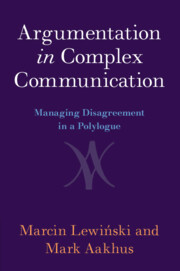Book contents
- Argumentation in Complex Communication
- Argumentation in Complex Communication
- Copyright page
- Contents
- Figures
- Preface
- Part I Seeking, Seeing, and Embracing Polylogue
- Chapter 1 Seeking Polylogue
- Chapter 2 The Dyadic Reduction
- Chapter 3 Seeing Polylogue
- Chapter 4 Embracing Polylogue
- Part II Analyzing, Evaluating, and Designing Polylogue
- References
- Index
Chapter 2 - The Dyadic Reduction
from Part I - Seeking, Seeing, and Embracing Polylogue
Published online by Cambridge University Press: 22 February 2023
- Argumentation in Complex Communication
- Argumentation in Complex Communication
- Copyright page
- Contents
- Figures
- Preface
- Part I Seeking, Seeing, and Embracing Polylogue
- Chapter 1 Seeking Polylogue
- Chapter 2 The Dyadic Reduction
- Chapter 3 Seeing Polylogue
- Chapter 4 Embracing Polylogue
- Part II Analyzing, Evaluating, and Designing Polylogue
- References
- Index
Summary
This chapter exposes the received dyadic model of communication and then critically analyzes the presumptions of the model. This reductive model, which views communication as evolving from a basic unit of face-to-face dialogue between two people, has dominated understanding of communication from ancient dialectic to today’s speech act theory, conversation analysis, and argumentation theory – the disciplines discussed in the chapter. While the dyadic reduction has a long, important history in theorizing argumentation and communication – a history that is briefly recounted, going back to the dialectical roots of argumentation theory – the principle of reduction becomes unjustified reductionism that bypasses polylogical realities of argumentation and communication.
Keywords
- Type
- Chapter
- Information
- Argumentation in Complex CommunicationManaging Disagreement in a Polylogue, pp. 33 - 57Publisher: Cambridge University PressPrint publication year: 2022

